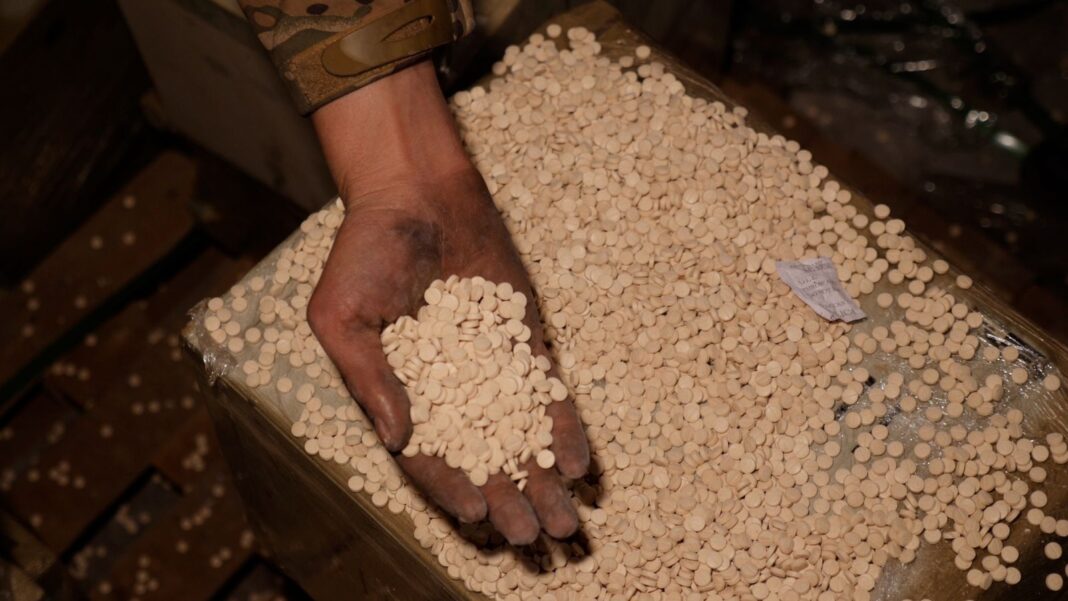Now Bashar al Assad has gone, there is so much to see and film in Syria which was impossible to document before.
The extent, for example, of the regime’s involvement in the captagon trade, a speed-like amphetamine which flooded out of Syria and across the Middle East, was widely known but impossible to film, barring stashes discovered at customs or its prevalence across the Gulf party-scene.
Now Syria’s new guard, Hayat Tahrir al Sham (HTS), has taken over the villas and factories which belonged to the nation’s drug lords and are more than happy to show journalists how the captagon was produced and by whom.
We visit two locations, one a private villa near the Lebanese border and another, a captagon factory in a suburb outside Damascus. What hits you first is the smell. It’s tangy and metallic and sticks in your nostrils.
The guards at the villa, which looks like a stage set for Breaking Bad, say it gives them headaches. They’ve burnt the stash of captagon pills they discovered but they’ve kept the raw materials – barrels of caffeine, piled up sacks of what looks a bit like flour, and alcohol. They say they’ve been advised it might come in useful for medicines.
“In Idlib, as you know, we were separate,” says Abu Baker, an HTS soldier who’s happy to show me around. “Anyone who engaged in such activities would be kicked out of the city.
“But of course we knew about what was going on in the rest of Syria and with the regime. The regime was broke. The economy was dead. So they financed themselves with drug money.”
Sky News’ international correspondent Diana Magnay inside a captagon ‘factory’
The villas in this neighbourhood belonged to officers from Syria’s 4th armoured division which was run by Assad’s notoriously thuggish brother, Maher. The one we’re in was owned by a man the HTS guards call Colonel Baseem.
“Baseem was the big guy here in this area and he instilled fear in everyone who lived here, everything was off limits,” says Abu Bilal, a farmer who lives next door.
He’d been ordered to leave his home when construction on the villa started and he’d only dared to return when the regime fell. “I was honestly shocked when I found out about the drugs here, about these scary operations that were destroying the country. We didn’t know anything about this drug.”
Syria’s neighbours had long warned of the pernicious effects on their home soil of the captagon it trafficked. Many of the regime drug lords were under US, EU and UK sanctions. Limiting Syria’s illicit captagon exports was to be a bargaining chip in Assad’s attempts at normalising relations with other Arab states.
It was, according to the World Bank, the most valuable sector of Syria’s war-shattered economy, worth between US$1.9bn (£1.5bn) and US$5.6bn (£4.4bn), with Syrian GDP valued at not much more – US$6.2bn (£4.9bn) in 2023.
This content is provided by Spreaker, which may be using cookies and other technologies.
To show you this content, we need your permission to use cookies.
You can use the buttons below to amend your preferences to enable Spreaker cookies or to allow those cookies just once.
You can change your settings at any time via the Privacy Options.
Unfortunately we have been unable to verify if you have consented to Spreaker cookies.
To view this content you can use the button below to allow Spreaker cookies for this session only.

The factory produced chocolate and crisps above ground, narcotics below. Pills were stashed inside electrical switching systems, even plastic fruit. They carpeted the floors. Huge piles of captagon pills, worth anything from $2 to $20 each, depending on where they were sold.
“I fled the war to Egypt in 2014,” says factory owner Mohammad al Toot, who has just returned to Syria after a decade away.
“I found out while I was there that Amer Khayti took over my factory under the power of Maher Al Assad the terrorist, and alongside Bashar Al Assad and their gangs. They turned my food production facility into a drug operation. I went to the relevant authorities to claim my factory back but no one helped me.”
The 4th division may be gone but the captagon trade involves numerous different actors. Syria’s transition to narco state was relatively quick. Transitioning back out may not happen so fast.








